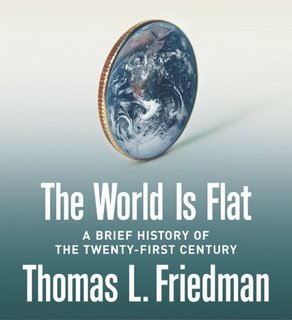
...says Thomas L. Friedman, New York Times three time Pulitzer prize winner. According to Friedman changes in the world of economics and technology have begun to produce a level playing field with enormous consequences for the future of humanity. As I was reading this book a thought occurred to me. Ceri and I are taking part in this process as bloggers. What can we do that won't be outsourced? Information crunching is a cultural phenomenon. For some time now I wanted to do a book blog. Not sure of what to do with my own blogs as I'm busy in the backroom of Ceridwen Devi Media most of the time. I thought quite simply I'll turn my two blogs into book blogs. Review what I'm reading and publish on Blogger and Wordpress. Two birds with one stone.
Friedman seemed the obvious place to start. He "describes the unplanned cascade of technological and social shifts that effectively leveled the economic world, and “accidentally made Beijing, Bangalore and Bethesda next-door neighbors.” Today, “individuals and small groups of every color of the rainbow will be able to plug and play.” Friedman’s list of “flatteners” includes the fall of the Berlin Wall; the rise of Netscape and the dotcom boom that led to a trillion dollar investment in fiber optic cable; the emergence of common software platforms and open source code enabling global collaboration; and the rise of outsourcing, offshoring, supply chaining and insourcing. Friedman says these flatteners converged around the year 2000, and “created a flat world: a global, web-enabled platform for multiple forms of sharing knowledge and work, irrespective of time, distance, geography and increasingly, language."
The process of globalization produces winners and losers like anything else. Today the Latinos of America are out on the streets demanding more rights in some of the largest demonstrations seen since the civil rights movement. They are as much a part of the process as Wal-Mart and Google. They also need to find a voice. I was in Berlin when the Wall came down. I shall never forget those days. The feeling that something big and unique was about happen.
The trick is to get on top of all this and use the opportunities that are there. Beware of the hype though. I see a world emerging on different time scales according to the amout of access people have to all these new gizmos. The social dimension seems to be ignored. Look at the explosion of the NGO "industry." As we remember John Kenneth Galbraith, who died on Saturday at the age of 97, let's hope that some of his ideas, that went out of fashion for a number of years, can live on to help us cope with the consequences of all this change. Friedman has asked the question, but not found the answer.
"While The World Is Flat is not a classic like From Beirut to Jerusalem, it is still an enthralling read. To his great credit, Friedman embraces much of his flat world's complexity, and his reporting brings to vibrant life some beguiling characters and trends. If his book is marred by an exasperating reliance on the first person and a surplus of catch phrases (" 'Friedman,' I said to myself, looking at this scene, 'you are so twentieth-century. . . . You are so Globalization 2.0' "), it is also more lively, provocative and sophisticated than the overwhelming bulk of foreign policy commentary these days. We've no real idea how the 21st century's history will unfold, but this terrifically stimulating book will certainly inspire readers to start thinking it all through." wrote the "Washington Post."
Wikipedia
No comments:
Post a Comment